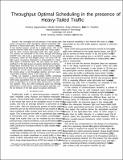Throughput Optimal Scheduling in the Presence of Heavy-Tailed Traffic
Author(s)
Jagannathan, Krishna Prasanna; Markakis, Michail; Modiano, Eytan H.; Tsitsiklis, John N.
DownloadTsitsiklis_Throughput optimal.pdf (148.9Kb)
OPEN_ACCESS_POLICY
Open Access Policy
Creative Commons Attribution-Noncommercial-Share Alike
Terms of use
Metadata
Show full item recordAbstract
We investigate the tail behavior of the steady-state queue occupancies under throughput optimal scheduling in the presence of heavy-tailed traffic. We consider a system consisting of two parallel queues, served by a single server. One of the queues receives traffic that is heavy-tailed (the “heavy queue”), and the other receives light-tailed traffic (the “light queue”). The queues are connected to the server through time-varying ON/OFF links. We study a generalized version of max-weight scheduling, called the max-weight-α policy, and show that the light queue occupancy distribution is heavy-tailed for arrival rates above a threshold value. We also obtain the exact `tail coefficient' of the light queue occupancy distribution under max-weight-alpha scheduling. Next, we show that the policy that gives complete priority to the light queue guarantees the best possible tail behavior of both queue occupancy distributions. However, the priority policy is not throughput optimal, and can cause undesirable instability effects in the heavy queue. Finally, we propose a log-max-weight (LMW) scheduling policy. We show that in addition to being throughput optimal, the LMW policy guarantees that the light queue occupancy distribution is light-tailed, for all arrival rates that the priority policy can stabilize. Thus, the LMW scheduling policy has desirable performance on both fronts, namely throughput optimality, and the tail behavior of the light queue occupancy distribution.
Description
https://conf.papercept.net/conferences/conferences/ALLER10/program/ALLER10_ContentListWeb_2.html#tha5_02
Date issued
2010-09Department
Massachusetts Institute of Technology. Department of Aeronautics and Astronautics; Massachusetts Institute of Technology. Department of Electrical Engineering and Computer ScienceJournal
Proceedings of the Allerton Conference on Communication, Control, and Computing
Publisher
Curran Associates, Inc.
Citation
Jagannathan, K. et al. “Throughput optimal scheduling in the presence of heavy-tailed traffic.” Communication, Control, and Computing (Allerton), 2010 48th Annual Allerton Conference on. Sept. 29 2010-Oct. 1 2010. 953-960.
Version: Author's final manuscript
Other identifiers
INSPEC Accession Number: 11795692
ISBN
978-1-4244-8215-3